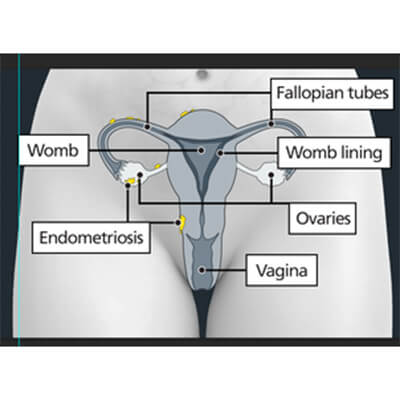What Is Endometriosis?

Endometriosis: photo credit : NHS
Endometriosis is a condition where tissue similar to the lining of the uterus (endometrium or endometrial-like) grows outside the uterus, often on the ovaries, fallopian tubes, or other areas within the pelvis. This misplaced tissue causes symptoms such as pain and discomfort, though some individuals may experience no noticeable symptoms.
Important Facts to Know
Endometriosis is a relatively common condition, impacting about 1 in 10 individuals with a uterus or ovaries during their reproductive years. Despite its prevalence, diagnosing endometriosis can be difficult due to its wide range of symptoms, which often vary from person to person. Early recognition and symptom management are key to finding effective treatment options.
On average, it can take 7 to 12 years from the onset of symptoms to receive a diagnosis. Normal imaging results do not always rule out endometriosis.
Symptoms and the Role of Hormones
Endometriosis symptoms can occur both during menstruation and outside of it. Common symptoms include:
- Pain during bowel movements or urination
- Painful intercourse
- General fatigue
Pelvic MRI may be more sensitive in detecting endometriosis compared to other imaging methods. It’s possible to start holistic therapies if you suspect endometriosis, even if imaging does not confirm it.
Chronic, undiagnosed endometriosis can lead to overlapping conditions such as irritable bowel syndrome or painful bladder syndrome, highlighting the importance of considering endometriosis in patients with pelvic pain.
Hormones, particularly oestrogen, significantly influence the growth of endometrial tissue. Oestrogen causes the tissue to thicken and shed during the menstrual cycle, leading to pain and inflammation. Managing hormonal imbalances is crucial in addressing endometriosis symptoms.
The Impact of Tampons on Hormonal Balance
Period products, particularly those made from GMO (genetically modified) cotton, may affect hormonal balance. These tampons are often treated with insecticides that act as xenoestrogens—chemicals that mimic oestrogen in the body. This exposure may contribute to oestrogen dominance and exacerbate conditions like endometriosis.
To reduce this risk, consider using organic tampons or menstrual cups, which are less likely to introduce foreign hormones into your system.
Dietary Considerations
Diet also plays a significant role in managing endometriosis. Certain foods can influence hormone levels and inflammation. To potentially alleviate symptoms, consider:
- Reducing dairy intake: Dairy products often contain growth hormones that may contribute to endometrial tissue growth.
- Avoiding GMOs, grains, soy products, and sugar: These foods can have oestrogen effects that may worsen inflammation.
- Opting for organic foods and hormone-free meats: This helps reduce exposure to harmful chemicals that mimic oestrogen.
The Impact of Environmental Factors
Environmental factors can also impact endometriosis. Chemicals in insecticides, herbicides, pesticides, and fungicides can mimic oestrogen and stimulate endometrial tissue growth. To mitigate this risk, choose organic food and products or grow your own vegetables when possible.
Nutritional Support and Supplements
Certain supplements may support the management of endometriosis:
- Aromatase Inhibitors: Herbs like stinging nettle root may help regulate oestrogen levels.
- Vitamin K2: May aid in managing heavy menstrual bleeding by promoting proper blood clotting.
Always consult with your healthcare provider before starting any new supplement regimen, considering your medical history.
Contact Us Today
While there isn’t a one-size-fits-all solution, a holistic approach to health and wellness can significantly enhance your ability to manage endometriosis. If you have any questions or wish to discuss your care options further, contact us today to book an appointment with Harvey Young, a London chiropractor and integrative health expert.
Disclaimer: Our educational content is not meant to replace your medical treatment. Always seek professional advice for your health-related issues.
